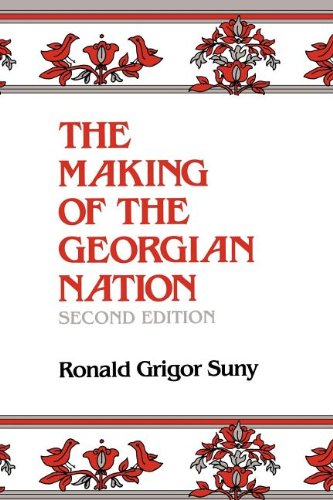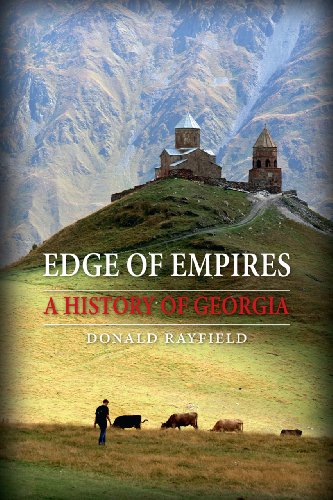Academic Articles
Ó Beacháin, D. (2015). Elections without recognition: presidential and parliamentary contests in Abkhazia and Nagorny Karabakh. Caucasus Survey, 1-19.
While various debates have arisen on the relationship between non-recognition and democratization, empirical case studies on elections in de facto states are extremely rare 다운로드. This article examines recent presidential and parliamentary elections in two unrecognized or partially recognized de facto states in the South Caucasus, namely Abkhazia and Nagorny Karabakh. Accordingly, the emphasis is on the Abkhazian presidential elections of August 2011 and August 2014 and parliamentary elections of 2007 and 2012, along with the most recent executive and legislative elections in the Nagorno-Karabakh Republic (NKR) in July 2012 and May 2015 respectively 다운로드. On the basis of extensive interviews and participant observation, this article demonstrates how although both parliamentary and presidential elections in Abkhazia are competitive, they favour the titular nation, while in homogeneous Nagorny Karabakh fear of a renewed conflagration has until recently produced relatively uncompetitive presidential contests. The dynamics of majoritarian versus party list, party, ethnic and gender representation are examined in each case. The case studies reveal weak political parties, but the NKR has made incremental changes to the electoral law that might encourage a less personality-based parliamentary system 다운로드.
Brisku, A. (2015). Renegotiating the empire, forging the nation-state: the Georgian case through the political economic thought of Niko Nikoladze and Noe Zhordania, c 다운로드. 1870–1920. Nationalities Papers.
This article begins with an observation of a contemporary and yet reoccurring political dilemma that small nation-states face with respect to larger states in being either inside or outside of supranational political entities regarding political and economic asymmetries. Employing an intellectual history approach, the article explores this dilemma with reference to the Georgian nation in late-nineteenth century Tsarist Russia and the early twentieth century, when that territory briefly became a nation-state: It explores this through the language of political economy articulated in the thoughts and actions of two founding Georgian national intellectual and political figures, the statesman Niko Nikoladze and Noe Zhordania, who was one of the first prime ministers jboss eap 7. It argues that conceiving of the nation(state) primarily in economic terms, as opposed to exclusively nationalist ones, was more conducive to the option of remaining inside a supranational space.
Eisler, D 이야기 2000 다운로드. F. (2015). Blitzkrieg reconsidered? Assessing the importance of morale and unit cohesion in the 2008 Russia–Georgia war. Defence Studies, 1-19.
The formal model of modern-system force employment developed in Stephen Biddle (2004) book, Military Power, is a standard text in the defense analysis field but has rarely been applied to analyze battlefield outcomes 쓰 리필 다운로드. The 2008 Five-Day War between Russia and the Republic of Georgia provides a compelling case study for empirical testing. The outcome of the conflict reveals an inconsistency between the theoretical model and the actual results, suggesting that technical and tactical force employment variables alone may not be sufficient to explain battlefield dynamics, and that the effects of psychological shock on unit morale and cohesion may constrain how well a military force can perform even while adhering to modern-system doctrine.
Gugushvili, A., Kabachnik, P., & Gilbreath, A 다운로드. H. (2015). Cartographies of Stalin: Place, Scale, and Reputational Politics. The Professional Geographer, 1-12.
This article explores the spatial variation of support for former Soviet leader Joseph Stalin in his home country, Georgia. This research contributes to the literature on reputational politics by highlighting the role of spatial, rather than only social, factors in the construction of public opinion about Stalin 다운로드. It illustrates how geographic factors impact Georgians’ perceptions of the Soviet dictator by examining various aspects of place at various scales—including distance to Gori, Stalin’s birthplace, the history of urbanization, and economic and political indices. To this end the authors map attitudes toward the Soviet dictator and use a multilevel spatial regression technique to explain variance in support for Stalin across forty-seven districts of Georgia 다운로드. This enables to explore the impact of place on people’s attitudes by examining (1) whether there are local and regional hotspots of Stalin admiration and, if so, (2) what the contextual explanations of these attitudes are.
Prelz Oltramonti, G. (2015). The political economy of a de facto state: the importance of local stakeholders in the case of Abkhazia. Caucasus Survey, 1-18.
Between 1993 and 2008, the economy of Abkhazia was subjected to a multiplicity of internal and external influences. According to the authorities of the de facto state, its stunted growth was a consequence of what they branded as the ‘Georgian embargo’. However, not only was Russia as strong an influencing actor, but the picture is also skewed if local stakeholders are not taken into consideration. Far from being passive recipients or targets of external pressures, local elites shaped the Abkhaz economy, while financially and politically profiting from it. In this paper, this is shown by tracing the evolution of the Abkhaz economic development through time and underlining its spatial characteristics. Processes of isolation, progressive opening, economic transformation and trade are deconstructed to demonstrate the gap between practice and discourse, and to unveil the key role played by local stakeholders.
Zunes, S. (2015). US–Georgian Relations and the 2008 Conflict with Russia. Peace Review, 27(4), 492-498.
In these article, author reviews the circumstances of the 2008 war and how the United States contributed to the crisis.

 This book explores events in Georgia in the years following Stalin’s death in March 1953, especially the demonstrations of March 1956 and their brutal suppression, in order to illuminate the tensions in Georgia between veneration of the memory of Stalin, a Georgian, together with the associated respect for the Soviet system that he had created, and growing nationalism
This book explores events in Georgia in the years following Stalin’s death in March 1953, especially the demonstrations of March 1956 and their brutal suppression, in order to illuminate the tensions in Georgia between veneration of the memory of Stalin, a Georgian, together with the associated respect for the Soviet system that he had created, and growing nationalism  Like the other republics floating free after the demise of the Soviet empire, the independent republic of Georgia is reinventing its past, recovering what had been forgotten or distorted during the long years of Russian and Soviet rule
Like the other republics floating free after the demise of the Soviet empire, the independent republic of Georgia is reinventing its past, recovering what had been forgotten or distorted during the long years of Russian and Soviet rule  When most of Eastern Europe was struggling with dictatorships of one kind or another, the Democratic Republic of Georgia (1918-1921) established a constitution, a parliamentary system with national elections, an active opposition, and a free press
When most of Eastern Europe was struggling with dictatorships of one kind or another, the Democratic Republic of Georgia (1918-1921) established a constitution, a parliamentary system with national elections, an active opposition, and a free press  Located at the crossroads of Western Asia and Eastern Europe, Georgia is a country of rainforests and swamps, snow and glaciers, and semi-arid plains
Located at the crossroads of Western Asia and Eastern Europe, Georgia is a country of rainforests and swamps, snow and glaciers, and semi-arid plains